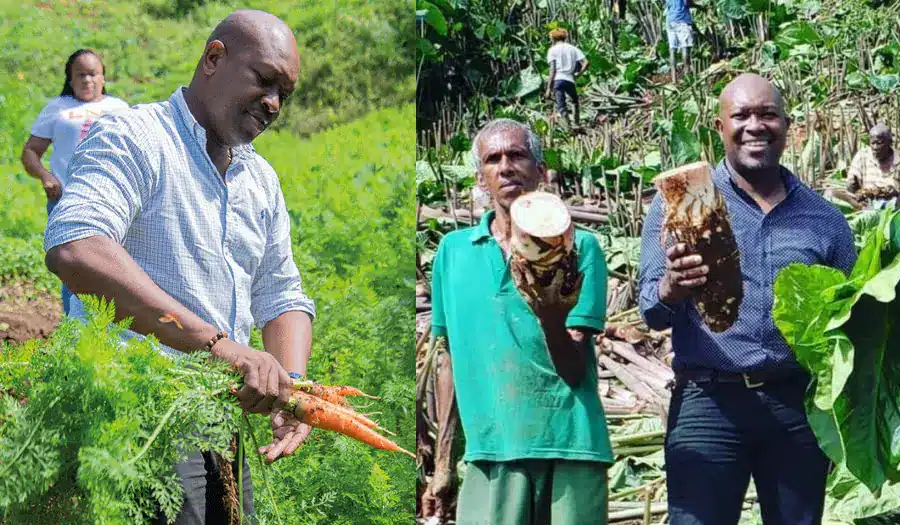The journey has been a long and winding one for Agriculture Ministers in Caricom, since our last CWA, last year. In 2023, in the Bahamas, we celebrated CWA under the theme: “Accelerating Vision 25 By 2025”.
I wish to thank the Inter-American Institute for Cooperation on Agriculture (IICA), for ensuring that Caricom Ministers of Agriculture were mobilized, and had a seat at the table at the Conference of the Parties (COP 28), in Dubai. And particularly so, since the farmers and fishers decide in a changing climate what is on the menu, we should be at the table!
It was at COP 28, that we reasoned, that the greatest threat to achieving Vision 25 by 2025 is Climate Change. Therefore, after careful consideration, the theme “Climate Smart Agriculture for a Sustainable Future” was crafted.
CWA 2024 was launched virtually on Friday, 14th, June, 2024. At that time, Hurricane Beryl was not conceived. Sixteen (16) days later, St. Vincent and the Grenadines, after having just given a global invitation to come to SVG, to discuss “Climate Smart Agriculture for a Sustainable Future,” was struck by a Category 4 Hurricane.
Over 90% of our bananas and plantains were destroyed, hundreds of fishing boats wholly or partially destroyed, a tuna vessel from SVG was later found in the Cayman Islands and our nation was taken to the brink of food insecurity.
On July 2nd, the day after the Hurricane, the question was asked, “are we still on for CWA 2024 in St. Vincent and the Grenadines”? The response was clear, “our resilence, team effort, faith and your support” will see us through. I must commend the staff at the Caricom Secretariat for your unwavering support. My Prime Minister, other members of Cabinet, Permanent Secretary, Chief Agriculture Officer and staff at the Ministry, farmers and fishers, stakeholder companies and agencies, all, we made it happen!
The Food and Agriculture Organisation (FAO) continues to provide significant technical support needed for our technicians to retool themselves and be able to address the vagaries of climate change.
The USAID CAPA project continues to bring fresh hope in our efforts to rethink climate smart strategies targeting an increase in agriculture production.
The University of the West Indies, through the launch of the “Post Graduate Diploma in Climate Resilient Agricultural Extension for Community Development” has sent a clear message that time is of the essence.
It encourages us to do the following as an important outcome of CWA 2024:
- All Member States must complete a situational analysis related to our readiness to address climate change adaptation and mitigation.
- All Member states ought to complete a national asset mapping exercise to be able to define the resources available and needed for Climate Smart Agriculture.
- A clear methodology for a well defined, structured and conceived national climate smart food production plan must be established and
- National budgets must be geared at executing these plans.
All of the players are in the room here today. We need focused discussions this week!
Madame Chair, please permit me to use an example. We must identify the agro-ecological zones in our member states that we know are naturally more resilient than others. In the case of St. Vincent and the Grenadines, Congo Valley, Mesopotamia Valley, Vermont Valley and Massariqua Valley have strategic micro-climates. We will be embarking on a national and regional discussion on maximizing production agro-zones across the region.
It is in this regard, that I take the opportunity to recognize the dedicated work of Professor Wayne Ganpat, of the Department of Agricultural Economics and Extension, St. Augustine. His work with extension officers around the region has given an appreciation of the need to adjust to suit the times. Our extension officers are on the frontline and must act responsibly at all times.
In our recent CARDI, meeting regarding resource mobilization, I wish to recognize the support of all friendly governments to our region for their efforts in partnering.
The work of the OECS through the Food and Agriculture Systems Transformation (FAST) strategy will continue to play a defining role in how the member states of the OECS address Climate change issues.
In a recently concluded conference on Sargussum Seaweed in Grenada, the European Union and the CRFM with other stakeholders addressed the formulation of a strategic framework to address the transformation of sargussum into a commodity for processing and trade. This waste to energy platform is an example of how innovative we must become.
Our education system from the pre-school to the tertiary level must be ready to adapt their programmes to include specific areas of climate action. This is not the time for anyone to be asking whether we drop Agriculture Science as a subject, but we must use the exigencies of our times to encourage more study in agriculture and fisheries at all levels.
Our farmers and farm workers, fishers and crew are now working in temperatures averaging 35 degrees Celsius, when 20 years ago, the temperatures were averaging 28 degrees Celsius. What does this mean for the hours of work? How do we protect our workers from this extreme heat? What does this mean for productivity? Do we now have to do field work from 5:30am to 8:30am and then from 4:30pm to 6:30pm.
Practical questions must be asked. The suppliers of fertilizer, climate change tolerant seeds, insurance companies, lending institutions and a mobilized civil society have been very engaging over the past months. Stakeholders are reporting for duty! They are not saying to consumers, “I’m not coming to work today.” Thanks for attending this Conference.
In St. Vincent and the Grenadines, the Zero Hunger Trust Fund, launched jointly with the Ministry of Agriculture a programme for 7,000 familes to establish grow beds for 80% of the vegetables they wish to consume. This is a direct response to the increase in the price of vegetables resulting from climate change challenges.
Caribbean Week of Agriculture is in short, a moment for reflection, celebration and preparation. We must reflect on the journey by conducting a critical assessment of our work. It is a moment for us to celebrate Caribbean Unity and our united focus to pursue a joint framework to reduce our food import bill in challenging times.
We celebrate achievements of many who are pursing home grown solutions. During the course of this week, on Thursday 10th October, St. Vincent and the Grenadines will sign onto the Climate Smart Agriculture Compliant C-SAC platform, as the de jure national climate smart agriculture training, self-assessment, auditing and marketing protocol. We cannot continue to speak around the issue. We must take action!
Food has always played a critical role in shaping world history. Whether it was the search across the Bering Strait. The settlements along the Nile. The movement down through Latin America, the movement up the Orinoco and through the Lesser and Greater Antilles, or the search for raw material in the West Indies. Now I predict that where we cannot and cannot grow food as a result of Climate change will have a significant impact on the next wave of human migration. Our farmers, fishers, agro-processors, agro- supply chain mobilizers we love you! CWA 2024 is about our appreciation for your hard work. To be or not to be, let us ensure that we play our part, while we have the responsibility so to do.





